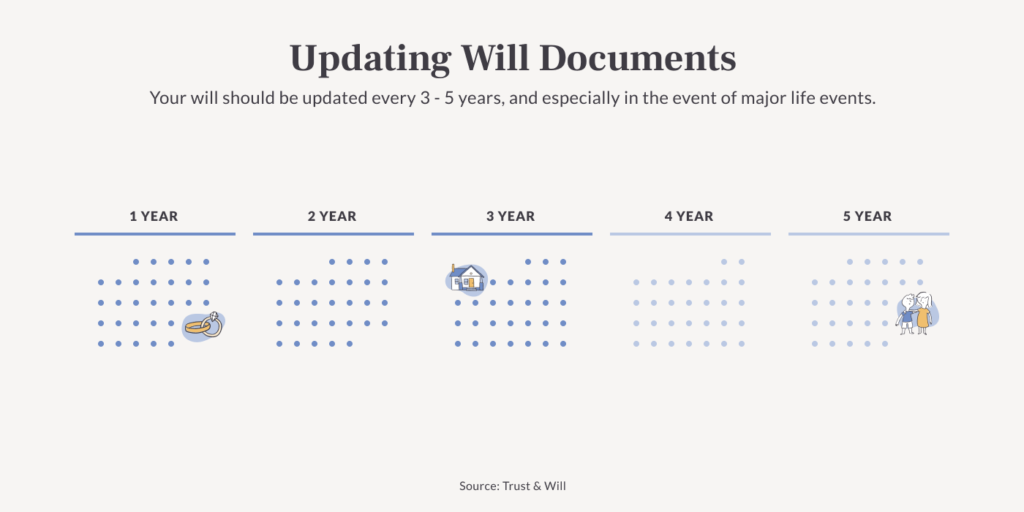

Curious if it’s possible to make changes to or update your Will? The answer is yes! Learn how to go about making Will changes in our comprehensive guide.

Head of Legal , Trust & Will
Create your estate plan or file for probate today.
Share this article
Have you already gone through the process of completing your Estate Planning? Maybe you have your Last Will and Testament and Trust done? Great! You’re already ahead of the game!
But when did you do it? Do you know when to review your Estate Planning documents, and if necessary, make Will changes or updates? It’s recommended you do so every three to five years or each time you have a major life event like a marriage, divorce, death, birth of a child, etc.
If you’re in the have it done but need to update it camp, this article is for you! Here, we’ll discuss everything you need to know about how and when amending a Will is necessary. We’ll even discuss the most commonly asked questions that people typically have when going through the process.
If at some point you’ve taken the time (and likely spent the money) to go through the steps and complete your Estate Plan, you know that the process can be difficult, and for some, confusing or stressful. Estate Planning is an incredibly important part of safeguarding your loved ones and protecting your legacy. But it does no good if it’s outdated or incomplete due to changes in life that aren’t reflected in your plan.
Many people wonder if amending a Will without a lawyer is possible, and the answer is absolutely! There are three ways to handle major life events that require updates to your Estate Plans:
Just knowing that changing a Will is fairly easy should put your mind at ease. But how do you know when to change it? Essentially, the “right” answer is this: your Will should be updated whenever you feel it’s necessary to do so. As we noted earlier, a good rule of thumb is you should at least review your Estate Plans every three to five years, but there’s definitely no need to wait that long should you have any major life events that warrant updates sooner. That said, there are a handful of specific times that really would dictate taking the time to review and update not just your Will, but all of your Estate Planning documents. These major life events could include:

It’s normal to feel a little anxiety about the prospect of having to change your Will. But most people find that, armed with the right information, they feel confident and ready to tackle the task. We’d even venture to bet that once you’re done, you’ll wonder why you waited so long to do it in the first place!
Read some of these commonly asked questions about how to change a Will, and if you’re still unsure about anything after that, reach out. We can answer any questions you may have about the process.
The cost associated with changing a Will can vary based on a number of factors. Did you plan to use a lawyer or do you prefer DIY? How complex are the changes? What state do you live in? These types of questions must be answered in order to accurately estimate the cost of amending a Will.
Lawyers can charge a wide range of fees, but it’s pretty common for the cost to be anywhere between $100 - $500. Of course, it is possible to make changes completely on your own, but many people are nervous about doing so and find they have a nagging fear that they may not have done everything they should have so their new Will is valid. Note that Here at Trust & Will, you can be confident in the fact that attorneys and Estate Planning experts prepare our documents, and we only charge members $19 per year to make unlimited updates and changes to Wills!
Technically, yes, you can make handwritten changes to your Will. But different states have different laws about how and when this is acceptable, so you want to be very careful about doing so. It can be very easy for family members to challenge handwritten changes in Wills, so ideally, if you want your Will and any updates to be as solid as possible, handwritten changes are not advisable.
Changing the Executor of a Will is relatively simple. You can do so by creating a codicil, which is a written amendment that makes changes to your Will. Be sure you understand your specific state laws so your codicil is valid. The number of witnesses and whether or not you need a notary can be different depending on your state.
To make a Will null and void, you can do a few different things. Technically, making a new Will or adding a codicil will make your original version null and void. Of course, you could also take extreme measures like destroying all original copies, or selling, giving away or otherwise letting go of assets that are named in the Will.
Once your will is updated, you still have to make sure you have the proper signatures and witnesses to satisfy your state laws. You may need to get your Will notarized, and you want to store it somewhere safe. Be sure to let someone trusted know where your Will and other Estate Planning documents are located.
It’s a good idea to review all of your Estate Planning documents from time to time. Knowing what you need to do to update your Will (and when to do it) is important. Whether you just had one major life event, or if you haven’t revisited your Will in many years and a number of things have changed, keeping your Will up-to-date is an essential part of protecting your family after you’re gone.
Now you’re ready to go through the steps and make sure your Will is as effective as possible when the time comes it’s needed. Things change in life, but changing a Will doesn’t have to be hard, time-consuming or costly!
Whether you have an existing Will that needs a refresh or you’re ready to create a new Will, connect with Trust & Will today to start your Will.
Share this article